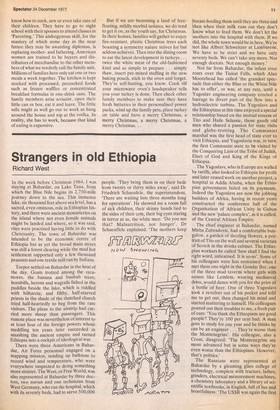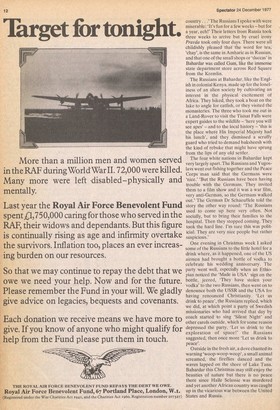Strangers in old Ethiopia
Richard West
In the week before Christmas 1964, I was staying at Bahardar, on Lake Tana, from which the Blue Nile begins its 2,750-mile journey down to the sea. This immense lake, six thousand feet above sea level, has a sacred, even ominous, role in Ethiopian history, and there were ancient monasteries on the island where not even female animals might be landed and where, so it was said, rites were practised having little to do with Christianity. The town of Bahardar was intended to be the economic centre of Ethiopia but as yet the broad main street was still a forest clearing while the mud hut settlement supported only a few thousand peasants and one textile mill run by Indians.
Torpor settled on Bahardar in the heat of the day. Goats trotted among the sycamores, the banana and baobab trees; hornbills, herons and wagtails fished in the puddles beside the lake, which is riddled with bilharzia; and filthy, half-starved priests in the shade of the thatched church tried half-heartedly to beg from the rare visitors. The plane to the airstrip had carried more sheep than passengers. This remote place was nevertheless of interest to at least four of the foreign powers whose meddling ten years later succeeded in smashing the ancient empire and turned Ethiopia into a cockpit of ideological war. There were three Americans in Bahardar, Air Force personnel engaged on a mapping mission, sending up balloons to record wind and temperature, who were everywhere suspected to doing something more sinister. The West, or Free World, was also represented at Bahardar by three doctors, two nurses and one technician from West Germany, who ran the hospital, which with its seventy beds, had to serve 500,000 people. 'They bring them in on their beds from twenty or thirty miles away', said Dr Friedrich Schaeufele, the superintendent, 'There are waiting lists three months long for operations'. He showed me a room full of sick children, their skinny hands tied to the sides of their cots, their big eyes staring in terror at us, the white men: 'Do you see that? Malnutrition, not hunger', Dr Schaeuffele explained. 'The mothers keep breast-feeding them until they are three and then when their milk runs out they don't know what to feed them, We don't let the mothers into the hospital with them. If we did, the whole town would be in here. We're not like Albert Schweitzer at Lambarene. We have to be strict and we have only seventy beds. We can't take any more. Not enough doctors. Not enough money.'
Not far from Bahardar, the infant river roars over the Tisisat Falls, which Alan Moorehead has called 'the grandest spectacle that either the Blue or the White Nile has to offer', or was, at any rate, until a Yugoslav engineering company erected a barrage to divert part of the flow into a hydroelectric turbine. The Yugoslays and the Ethiopians at this time enjoyed a special relationship based on the mutual esteem of Tito and Haile Selassie, those gaudy old men who shared a passion for state visits and globe-trotting. The Communist marshal was the first head of state ever to visit Ethiopia, and Yugoslavia was, in turn, the first Communist state to be visited by the Conquering Lion of the Tribe of Judah, Elect of God and King of the Kings of Ethiopia.
The Yugoslays, who in Europe are walled by tariffs, also looked to Ethiopia for profit and later ceased work on another project, a hospital in Addis Ababa, when the Ethiopian government failed on its payments. Indeed the Yugoslays are now the jobbing builders of Africa, having in recent years constructed the conference hall of the Organisation of African Unity in Gabon and the new 'palace complex', as it is called, of the Central African Empire.
The chief engineer at Bahardar, named Misha Zubradovic, had a comfortable bungalow, a garden of dazzling flowers, a portrait of Tito on the wall and several varieties of Scotch in the drinks cabinet. The Ethiopian workers he called 'how shall I find the right word, unlearned. It is so-so'. Some of his colleagues were less restrained when I met them one night in the Gondar Bar, one of the three mud taverns where girls with names like Lemlem, wearing mediaeval dress, would dance with you for the price of a bottle of beer. One of three Yugoslays took a revolver out of his pocket and told me to get out, then changed his mind and started muttering to himself. His colleagues poured out their troubles to me, a fresh pair of ears: 'You think the Ethiopians are good people? They're 100 per cent bad. A man goes to study for one year and he thinks he can be an engineer. . . They're worse than the Montenegrins'. His colleague, also a Croat, disagreed: 'The Montenegrins are more advanced but in some ways they're even worse than the Ethiopians. However, that's politics.'
The Russians were represented at Bahardar by a gleaming glass college of technology, complete with tractors, lathes, grinders, electrical measurement machines, a chemistry laboratory and a library of scientific textbooks, in English, full of lies and boastfulness: 'The USSR was again the first country . . .' The Russians I spoke with were miserable: `It'sfun for a few weeks but for a year, ech!' Their letters from Russia took three weeks to arrive but by cruel irony Pravda took only four days. There were all childishly pleased that the word for tea, `chay', is the same in Amharic as in Russian, and that one of the small shops or `duccas' in Bahardar was called Gum, like the immense state department store across Red Square from the Kremlin.
The Russians at Bahardar, like the English in colonial Kenya, made up for the loneliness of an alien society by cultivating an interest in the physical excitement of Africa. They hiked, they took a boat on the lake to angle for catfish, or they visited the monasteries. The three who took me out in a Land-Rover to visit the Tisisat Falls were expert guides to the wildlife — `here you will see apes' — and to the local history — `this is the place where His Imperial Majesty had his lunch', and they dismissed a scruffy guard who tried to demand baksheesh with the kind of rebuke that might have sprung from the lips of any old settler.
The four white nations in Bahardar kept very largely apart. The Russians and Yugoslays went out fishing together and the Peace Corps man said that the Germans were 'nice.' But the Russians have been having trouble with the Germans. They invited them to a film show and it was a war film, very anti-German, so the Germans walked out.' The German Dr Schaeuffele told the story the other way round: 'The Russians used to come up here very often. Not socially, but to bring their families to the hospital. Then they stopped coming. They took the hard line. I'm sure this was politicial. They are very nice people but rather suspicious.'
One evening in Christmas week I asked some of the Russians to the little hotel for a drink where, as it happened, one of the US airmen had brought a bottle of vodka to celebrate his wedding anniversary. The party went well, especially when an Ethiopian noticed the 'Made in USA' sign on the bottle, jeered, `They have stolen your vodka' to the two Russians, then went on to denounce both the USSR and the USA for having renounced Christianity. 'Let us drink to peace', the Russians replied, which we did, at which point a party of Swedish missionaries who had arrived that day by coach started to sing 'Silent Night' and other carols outside, which for some reason depressed the party. 'Let us drink to the exploration of space!' the Russians suggested, then once more 'Let us drink to peace'.
Outside in the fresh air, a dove chanted its warning `woop-woop-woop', a small animal screamed, the fireflies danced and the waves lapped on the shore of Lake Tana. Bahardar this Christmas may still enjoy the beauties of nature but there is no peace there since Haile Selassie was murdered and yet another African country was caught up in the vicarious war between the United States and Russia.











































 Previous page
Previous page